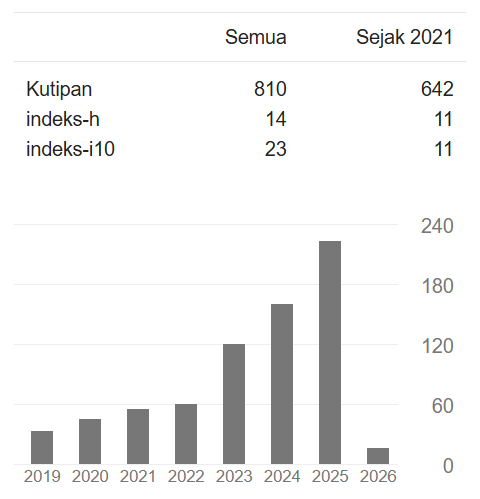SUHRAWARDĪ’S CONCEPT OF ILLUMINATION AND ITS RELEVANCE TO ENVIRONMENTAL CONSERVATION AWARENESS
A SUFI ECOLOGICAL APPROACH
DOI:
https://doi.org/10.20871/kpjipm.v10i2.375Keywords:
Biospherical Egalitarianism, Ecological Sufism, Environmental Conservation, Equilibrium-Illuminative, Illumination, Shihāb al-Dīn al-SuhrawardīAbstract
This study investigates Shihāb al-Dīn al-Suhrawardī's sufi philosophy of illumination and explores its potential contribution to contemporary environmental consciousness. The increasingly urgent global ecological crisis has sparked interdisciplinary debate about root causes and comprehensive solutions. Several contemporary thinkers argue that the ecological crisis is a manifestation of a more fundamental ontological crisis, namely the loss of humans' harmonious relationship with nature. In this context, Islamic philosophy, especially the school of illumination (ishrāq) developed by Shihāb al-Dīn al-Suhrawardī, offers a unique perspective that can enrich environmental discourse. The research aims to integrate Suhrawardī’s ontological and epistemological concepts with contemporary ecological principles to offer a novel perspective on human-nature relationships. A descriptive-analytical approach is employed to analyze Suhrawardī’s philosophical texts and correlate them with modern ecological theories. The study reveals that Suhrawardī’s concept of asala al-mahiya (essential reality) and his illuminationist epistemology, which views all beings as emanations of divine light, challenge the anthropocentric worldview. This perspective promotes two fundamental ecological principles: biospherical illuminative egalitarianism and illuminative equilibrium. These principles emphasize social justice and environmental balance, recognizing humans as integral parts of nature with responsibility for its preservation. By shifting the human-nature relationship from a subject-object dichotomy to an inter-subject interaction, Suhrawardī’s philosophy can enhance awareness of environmental issues and inspire more sustainable practices. Integrating spiritual wisdom and ecological consciousness offers a holistic approach to addressing contemporary environmental challenges.
Downloads
References
Afrasiabi, Kaveh L. 2003. “Toward an Islamic Ecotheology.” In Islam and Ecology: A Bestowed Trust, Edited by Richard C. Foltz. Cambridge: Harvard University Press.
Aminrazavi, Mehdi. 2003a. “How Ibn Sīnian Is Suhrawardī’s Theory of Knowledge?” Philosophy East and West 53 (2): 203–14.
———. 2003b. “Mysticism in Arabic and Islamic Philosophy.” In Stanford Encyclopedia of Philosophy. Stanford.
Amirullah, Amirullah. 2015. “Krisis Ekologi: Problematika Sains Modern.” Lentera: Jurnal Ilmu Dakwah dan Komunikasi 17 (1): 145017. https://doi.org/10.21093/lj.v17i1.425.
“Anthropocentrism | Human-Centered Philosophy & Ethics | Britannica.” N.D. Accessed July 18, 2023. https://www.britannica.com/topic/anthropocentrism.
Assya’bani, Ridhatullah, and Ghulam Falach. 2022. “The Philosophy of Illumination: Esotericism in Shihāb Ad-Dīn Suhrawardī’s Sufism.” ESENSIA: Jurnal Ilmu-Ilmu Ushuluddin 23 (1): 53–64. https://doi.org/10.14421/esensia.v22i2.2398.
Attas, Syed Muhammad Naquib Al-. 1995. Prolegomena to the Metaphysics of Islam: An Exposition of The Fundamental Elements of The Worldview of Islam. Kuala Lumpur: Institut Antarabangsa Pemikiran dan Tamadun Islam.
Capra, Fritjof. 2002. The Hidden Connections: Integrating the Biological, Cognitive, and Social Dimensions of Life into A Science of Sustainability. 1st Ed. New York: Doubleday.
Chittick, William C. 2007. Science of the Cosmos, Science of The Soul: The Pertinence of Islamic Cosmology in The Modern World. Oxford: Oneworld.
Davar, Mohamad Mahdi. 2024. “Investigating the Arguments of Necessary of Existence (Wājib Al-Wujūd) In Suhrawardī’s Philosophy Based on Al-Talwīḥāt And Ḥikmah Al-Ishrāq.” Kanz Philosophia: A Journal for Islamic Philosophy and Mysticism 10 (1): 19–34. https://doi.org/10.20871/kpjipm.v10i1.311.
Devall, Bill, and George Sessions. 1999. Deep Ecology. Nachdr. Salt Lake City, Utah: Smith.
Drengson, Alan, Ed. 2005. “The Shallow and The Deep, Long-Range Ecology Movement: A Summary.” In The Selected Works of Arne Naess, 2263–69. Dordrecht: Springer Netherlands. https://doi.org/10.1007/978-1-4020-4519-6_85.
Fayyadl, Muhammad Al-. 2003. Hikmah Al-Isyraq: Teosofi Cahaya dan Metafisika Hudluri. Jakarta: Futuh Printika.
Foltz, Richard C. 2003. Foltz, Richard C. 2003a. Islam and Ecology a Bestowed Trust. Cambridge: Harward University Press.
———. 2003b. “Islamic Environmentalism: A Matter of Interpretation.” In Islam and Ecology: A Bestowed Trust. Cambridge: Harvard University Press.
Ihsan, Nur, Martin Perdana, and Yongki Sutoyo. 2022. “The Concept of Suhrawardi’s Hudhuri Epistemology and Its Relevance to The Contemporary Challenges.” Dialogia 20 (June):84–108. https://doi.org/10.21154/dialogia.v20i1.3364.
Irawan, Irawan. 2017. “Ekologi Spiritual: Solusi Krisis Lingkungan.” Scientia: Jurnal Hasil Penelitian 2 (1): 1–21. https://doi.org/10.32923/sci.v3i2.945.
Izutsu, Toshihiko. 1960. The Fundamental Structure of Sabzawari’s Metha Physics. Introduction to Sabzawari’s Syarh-I Manzumah. Tehran: Me.Gill Univ. Institute of Islamic Studies.
Khalid, Fazlun. 2019. Signs On the Earth: Islam, Modernity and The Climate Crisis. Markfield: Kube Publishing.
Marcotte, Roxanne D. 2001. “Al-Suhrawardi Maqtūl, The Martyr of Aleppo.” Al-Qantara 22 (2): 395–419.
Muhammad, Muhammad, M. Zubad Nurul Yaqin, Fakhris Khusnu Reza Mahfud, and Fahd Mohana S. Alahmadi. 2024. “Freedom That Is Not Absolute: Ecological Ethics and Human-Nature Relationship in The Qur’an.” Studia Ecologiae Et Bioethicae, July. https://doi.org/10.21697/seb.5821.
Muslih, Muhammad. 2010. Pengetahuan Intuitif Model Husserl & Suhrawardi. Ponorogo: Ponorogo: Central for Islamic and Occidental Studies.
Næss, Arne, Alan R. Drengson, and Bill Devall. 2008. Ecology of Wisdom: Writings by Arne Naess. Berkeley, CA: Counterpoint: Distributed by Publishers Group West.
Nasr, Seyyed Hossein. 1989. “Existence (Wujūd) and Quiddity (Māhiyyah) in Islamic Philosophy.” International Philosophical Quarterly 29 (4): 409–28. https://doi.org/10.5840/ipq198929431.
———. 1990. Man and Nature: The Spiritual Crisis of Modern Man. London: Unwin.
———. 1996. History of Islamic Philosophy. London: Routledge.
———. 1996. Religion and the Order of Nature. New York: Oxford University Press.
———. 2007. “Islam, The Contemporary Islamic World, and the Environmental Crisis.” In Islam and Ecology: A Bestowed Trust, Edited by Richard C. Foltz. Cambridge: Harvard University Press.
Nur, Syaifan. 2002. Filsafat Wujud Mulla Sadra. Yogyakarta: Pustaka Pelajar.
Onin, Abdulkader M. H., and Loiy Hamidi Qutaish Alfawa’ra. 2023. “Teaching Ecological Awareness Through Literature: A Case Study of Ghassan Kanafani’s Returning to Haifa.” Manar Elsharq Journal for Literature and Language Studies 1 (1): 1–5. https://doi.org/10.56961/mejlls.v1i1.336.
Özdemir, Ibrahim. 2003. “Toward an Understanding of Environmental Ethics from A Qur’anic Perspective.” In Islam and Ecology: A Bestowed Trust, Edited by Richard C. Foltz. Cambridge: Harvard University Press.
Quadir, Tarik M. 2013. Traditional Islamic Environmentalism: The Vision of Seyyed Hossein Nasr. Lanham: University Press of America.
Razavi, Mehdi Amin. 1997. Suhrawardi and The School of Illumination. Surrey: Curzon Press.
Rizvi, Sajjad H. N.D. “Mulla Sadra and Metaphysics: Modulation of Being.” In The Stanford Encyclopedia of Philosophy, Edited by Edward N. Zalta.
Russel, Bertrand. 2004. Sejarah Filsafat Barat. Yogyakarta: Pustaka Pelajar.
Rustom, Mohammed, and Günther Sebastian. 2020. “Storytelling as Philosophical Pedagogy: The Case of Suhrawardī.” In Knowledge and Education in Classical Islam: Religious Learning Between Continuity and Change. Leiden: Brill.
Sadowski, Ryszard. 2024. “Roots of (and Solutions to) Our Ecological Crisis. A Humanistic Perspective.” Ecological Civilization 1 (1): 1–9. https://doi.org/10.35534/ecolciviliz.2023.10001.
Schroeder, Julia, Celia Coyne, and John Farndon. 2019. The Ecology Book. United States: DK Publishing.
Steffen, Will, Johan Rockström, Katherine Richardson, Timothy M. Lenton, Carl Folke, Diana Liverman, Colin P. Summerhayes, et al. 2018. “Trajectories of the Earth System in The Anthropocene.” Proceedings of The National Academy of Sciences of The United States of America 115 (33): 8252–59. https://doi.org/10.1073/pnas.1810141115.
Suhrawardī, Shihāb al-Dīn al-. 2010. Ḥikmah al-Ishrāq. Cairo: Dār al-Ma‘ārif al-Ḥikmah.
Sumadi, Eko. 2015. “Teori Pengetahuan Isyraqiyyah (Iluminasi) Syihabudin Suhrawardi.” Fikrah 3 (2): 227–304. https://doi.org/10.21043/fikrah.v3i2.1798.
Taylor, Bron, Gretel Van Wieren, and Bernard Zaleha. 2016. “The Greening of Religion Hypothesis (Part Two): Assessing the Data from Lynn White, Jr, to Pope Francis.” Journal for the Study of Religion, Nature and Culture 10 (3): 306–78. https://doi.org/10.1558/jsrnc.v10i3.29011.
Taylor, Paul W. 1986. Respect for Nature: A Theory of Environmental Ethics. Princeton: Princeton University Press.
Tiam, Sunardji Dahri. 2015. Historigrafi Filsafat Islam: Corak, Periodesasi, dan Aktualitas. Malang: Intras Publishing.
Tucker, and Mary Evelyn. 2003. Worldly Wonder: Religions Enter Their Ecological Phase. Chicago: Open Court.
Walbridge, John. 2000. The Leaven of The Ancients: Suhrawardi and The Heritage of The Greeks. Albany: State University of New York Press.
Warno, Nano. 2023. “Study Comparison of Knowledge by Presence in The Views of Ibn Sīnā, Suhrawardī, and Mullā Ṣadrā.” Kanz Philosophia: A Journal for Islamic Philosophy and Mysticism 9 (2): 333–52. https://doi.org/10.20871/kpjipm.v9i2.291.
White, Lynn. 1967. “The Historical Roots of Our Ecologic Crisis.” Science 155 (3767): 1203–7.
Widigdo, Mohammad Syifa Amin. 2014. “Suhrawardi’s Ontology: From ‘Essence-Existence’ to ‘Light’: (A Suhrawardian Reply to Sadrian Critiques).” Kanz Philosophia: A Journal for Islamic Philosophy and Mysticism 4 (2): 117–26.
Wijaya, Aksin. 2020. Satu Islam, Ragam Epistemologi. Yogyakarta: Ircisod.
Yazdi, Mehdi Ha’iri. 1992. The Principles of Epistemology in Islamic Philosophy: Knowledge by Presence. Albany: State University Of New York Press.
Ziai, Hossein. 1990. In Knowledge and Illumination: A Study of Suhrawardī’s Ḥikmat Al-Ishrāq. Atlanta.
Downloads
Published
How to Cite
Issue
Section
License
Copyright (c) 2024 Nur Hadi Ihsan, Moh. Isom Mudin, Mawardi Dewantara

This work is licensed under a Creative Commons Attribution 4.0 International License.
Most read articles by the same author(s)
- Nur Hadi Ihsan, Muhammad Thoriqul Islam, NŪR MUḤAMMAD IN THE PERSPECTIVE OF THE TIJANIYAH TAREKAT , Kanz Philosophia: A Journal for Islamic Philosophy and Mysticism: Vol. 9 No. 1 (2023): June





























